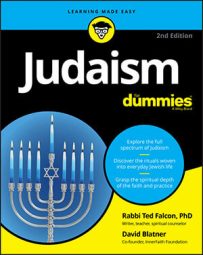Judaism has a long history of ensuring the rights of women. Case in point: the ketubah, or marriage contract between bride and groom. The terms of the ketubah (the plural is ketubot) are negotiated long before the wedding — much like today’s prenuptial agreements.
The agreement is signed with witnesses just before the ceremony, and then it’s usually read aloud during the ritual.
The earliest known ketubah is over 2,000 years old, and its wording and contents are virtually identical to that of a modern-day traditional Orthodox ketubah (which is in Aramaic, the language Jews spoke around the beginning of the first millennium).
While in recent years more liberal Jews have taken to writing their own ketubot – usually focusing more on the spiritual and interpersonal aspects of their relationship — the traditional ketubah long used by Orthodox Jews is clearly an unromantic legal document that spells out the financial obligations of each partner. It doesn’t even once mention God! And there’s no doubt that it’s designed to protect the rights of the woman.
For example, the ketubah provides for a lump sum to be paid to the woman in case of death or divorce (typically enough to live for a year, plus the value of any property she brought to the marriage), and it ensures that the man will support her through the life of their marriage. It even notes that a man must provide for his wife sexually.
In the days when polygamy was allowed, perhaps this provision protected older or less-desirable women from being neglected.
About 1,000 years ago, people began to commission illustrated ketubot. The art almost died out, but since the 1960s more couples have started using illuminated ketubot, and today you can buy a relatively inexpensive print of a beautiful ketubah from any Judaica shop. Similarly, you can have one custom-made for you.
The Ba’al Shem Tov taught that whenever a couple gets into a bad argument, they should read their ketubah out loud to each other. Everyone needs reminders sooner or later.

